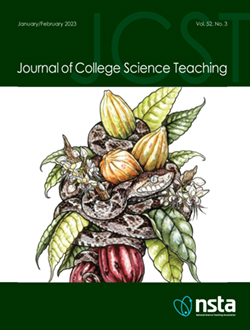Journal of College Science Teaching—January/February 2023
 January/February 2023
January/February 2023
Volume 52, Number 3
This issue of JCST offers a study that investigated how stress related to the COVID-19 disruption of the spring 2020 semester affected TAs’ self-efficacy. The results of the study are discussed in relation to PD programs providing experiences with multiple teaching modalities, strategies for time management, and mental health resources. It also features a look at how preservice elementary teachers learn about the nature of science and develop scientific literacy through a collaborative project that prepares them to design meaningful learning experiences for students. This issue's Case Study looks at conversation analysis to examine recorded interactions between an early-career postdoctoral mentor and a first-year undergraduate research student within the context of “mentoring by questioning” in a biochemistry research group.
Journal Article
The Role of Question-Asking in Mentoring Undergraduate Research
Undergraduate research is a high-impact educational practice for which effective mentoring has been identified as a key factor in determining its success. Some researchers have argued that effective mentors help increase students’ independence an...
By Sara L. Johnson and George M. Bodner
Journal Article
Teaching Assistant Responses to COVID-19
Undergraduate and graduate teaching assistants (TAs) are tasked with instructing undergraduate courses with little to no professional development (PD). To better develop PD opportunities, it is important to understand the benefits of improving TAs�...
By Cody Smith, Deepika Menon, Annette Wierzbicki, and Jenny Dauer
Journal Article
Using a Game to Teach Invasive Species Spread and Management
Invasive species are a major ecological and economic problem at the global scale, and education plays a major role in raising awareness and combating these species’ future spread. There are complex management and economic issues associated with p...
By Joshua Lord
Journal Article
Preservice Teachers’ Meaningful Science Learning
This article describes how preservice elementary teachers learn about the nature of science and develop scientific literacy through a collaborative project that prepares them to design meaningful learning experiences for students. The Life’s Repl...
By Lizzette M. Velázquez Rivera and Isaris R. Quiñones Pérez
Journal Article
This article describes a website called The Tachyon Nexus (no relation to Tachyon Nexus Inc.), which includes reliable information about the controversial subjects of time travel and faster-than-light particles known as tachyons. This compendium of...
By Robert Ehrlich
Journal Article
Newspaper Physics for First-Year College Students
This article describes and illustrates a physics course for first-year college students whose only knowledge of physics is that they do not like the subject. The physics content is driven entirely by what appears in the daily newspapers and general...
By E. J. Bahng, John Hauptman, and Jennifer Lowery
Journal Article
Despite more women and underrepresented students entering engineering, there are still gaps in achievement. A potential remedy is to establish equitable team dynamics during groupwork. Groupware systems have been implemented in the workforce and, r...
By Christine King, Kameryn Denaro, and Brian Sato
Journal Article
How Do Students Interact With the Primary Scientific Literature in an Undergraduate Science Program?
The ability to read, understand, and interpret primary scientific literature is an essential skill for undergraduate students in science. This study aimed to provide a detailed understanding of how second- and third-year undergraduate students in a...
By Yi Hou, Heather Verkade, Jan van Driel
Journal Article
Visual elements such as graphs, tables, and diagrams are essential components of scientific writing. Although scientific writing textbooks and guides often contain information on how to design such visuals, little has been written on how to effecti...
By Cary Moskovitz
Journal Article
A Mixed-Methods Analysis of Perspectives Toward Learning Assistant–Faculty Relationships
Learning Assistant (LA) programs oversee and support undergraduate instructors and faculty members who work together to facilitate student learning in a variety of classroom settings. The success of an LA program is tied to experiences of the parti...
By Cameron J. Hill, Anthony P. Barrasso, and Kathryn E. Spilios
Journal Article
Many undergraduates use research internships to gain experience for graduate school. Science, technology, engineering, and mathematics (STEM) programs involve heavy research and lab work duties, for which students are often unprepared and lack oppo...
By Adam T. Murry, Nan Yuan, and Dean Atkinson


